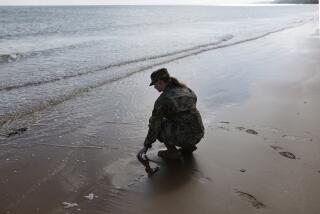National Day for Ex-POWs Stirs Old Memories
- Share via
WASHINGTON — Melvin Dyson and Ronald Ridgeway have never met, but they share a bond that transcends the 50-year difference in their ages and the distance between their homes in Portland and Houston.
At the age of 18, both became military prisoners of war--Dyson in France during World War I and Ridgeway in Vietnam. Dyson was held captive for 3 1/2 months; Ridgeway was believed dead but emerged after 61 months in prison.
Their treatment at the hands of their captors differed, they were held in different countries and they were confined for different lengths of time, but both shared what Ridgeway calls “the distress of the unknown--never knowing what tomorrow will bring.”
There will be special poignancy for thousands of former POWs in ceremonies around the country today, the date President Reagan has proclaimed national POW-MIA Recognition Day.
Since World War I, 142,227 Americans have been captured and held as military prisoners of war, according to the American Ex-Prisoners of War Assn. in Arlington, Tex. At the beginning of this year, 83,430 former POWs--more than 20,000 in California--were alive. An estimated 8,000 civilian prisoners of war also are living.
For some former POWs, time has eased the pain. For others, the mind has erased the burden of remembering. Some keep a diary; others speak out about the past or meet with former POWs from other wars to share experiences.
Now, a decade after he went to Vietnam, Jim Clay of Ontario, Calif., can talk about his experiences. Clay, whose late father had been a POW for two years during World War II, was held captive for 20 months in Vietnam. The elder Clay said little about his own experience, but, before the young Army draftee volunteered for Vietnam duty in 1966, his father told him: “No matter what happens, you can take it.”
Throughout his ordeal, Clay says now, “That’s what kept me alive.”
Dyson, now 87, believes that “time is the great healer. When you are young, you forget things.”
There seems little that Dyson has forgotten, however, from that day in September, 1918, when his Army patrol was surrounded by Germans in a patch of timber in northern France. He survived the ambush and eventually rode a Swiss train to freedom.
Dyson says that his experience pales in comparison to those of many POWs who were captured by the Japanese in the Philippines during World War II. “I know a lot of these guys,” he said. “They never say a lot about it but, down deep, they have scars that will never heal.”
“These men are survivors,” said Marian Squire, who heads a treatment and counseling program for former POWs at the Veterans Hospital in Loma Linda near Los Angeles.
More to Read
Sign up for Essential California
The most important California stories and recommendations in your inbox every morning.
You may occasionally receive promotional content from the Los Angeles Times.













